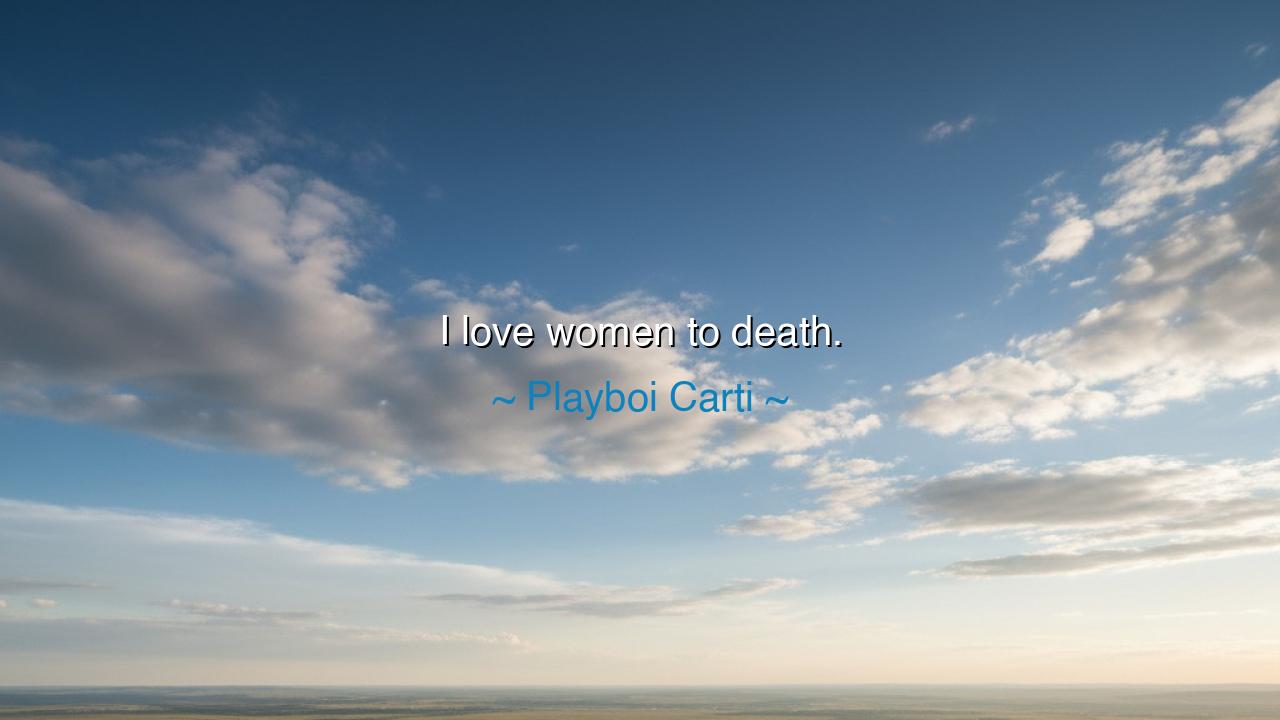
I love women to death.






“I love women to death.” Thus spoke Playboi Carti, the modern minstrel of rhythm and rebellion, a voice of youth that hides within it both simplicity and depth. Though his words seem born from the realm of passion and desire, they carry, when examined through the eye of wisdom, a truth as old as the dawn: that love, when pure and consuming, is a force that borders upon life and death. For to love “to death” is not to wish for the end, but to confess the totality of devotion, a love so fierce that it overwhelms the self, dissolving all boundaries between lover and beloved.
The origin of this quote lies within the world of music and fame, where artists often express emotions in their most vivid and unguarded form. Playboi Carti, an artist of the new generation, known for his enigmatic persona and raw intensity, spoke these words as both declaration and confession. In them is the modern echo of an ancient truth: that love, whether for woman, for beauty, or for the divine itself, has the power to consume. Like the poets of old who sang of love as fire and flame, Carti names his affection in the language of absolutes—“to death.” It is an exaggeration of the tongue, perhaps, but not of the heart.
To love “to death” is to recognize that true affection is not half-hearted. It does not dwell safely in moderation but thrives in sacrifice and risk. The ancients understood this well. Consider the tale of Antony and Cleopatra, two souls bound by passion that defied empire and duty. Antony, general of Rome, forsook his nation, his crown, and his future for the love of the Egyptian queen. Their love, though it ended in death, lives eternal in the memory of humankind because it was absolute. It was not tepid affection, but the kind that burns until it consumes. In their tragic union, one sees the truth of Carti’s words: that love, at its most profound, carries both ecstasy and annihilation.
Yet, there is more than passion in these words; there is also reverence. When Playboi Carti says, “I love women to death,” he speaks from a place of admiration—a recognition of woman as muse, as source, as life itself. Through her, life begins; through her grace, beauty takes form. Across ages, poets have bent the knee before this truth: that woman embodies the eternal cycle of creation and destruction, tenderness and strength. To love her “to death” is to honor her as both mystery and mirror of divinity. In loving woman, one learns to love life itself—for she, in her many forms, is the expression of its sacred rhythm.
But love, when left untempered, may also bring ruin. Many have perished beneath the weight of their own devotion. The poet Heathcliff in Wuthering Heights, destroyed by his love for Catherine, became a ghost of his former self, his passion turned to torment. Such stories remind us that while love gives life, it can also unmake it if it becomes obsession rather than reverence. Thus, when one says, “I love to death,” one must ask—does this love nourish, or does it consume? For the same flame that warms the heart can burn the soul if untamed.
The wisdom, then, lies in balance. To love deeply, one must also love wisely. Love should elevate, not enslave. It should drive creation, not destruction. Playboi Carti’s words, when stripped of their youthful bravado, remind us that passion is the essence of vitality—but it must be guided by respect and understanding. Love that honors, rather than possesses, becomes immortal. It transcends death not through destruction, but through the legacy it leaves behind—in art, in memory, in the quiet tenderness that outlasts all fire.
So, my friends, learn from these words. Love boldly, but love with reverence. Let your affection be fierce enough to break your heart and gentle enough to mend another’s. Do not fear the depth of your feelings, for they are proof of your humanity—but let them be tempered by wisdom, as steel is tempered by flame. To love “to death” is to give all of yourself; to love with balance is to give that self eternity.
And thus, the teaching stands: love is both life and death, fire and renewal. To love truly is to stand at the edge of mortality and creation at once—to feel the divine pulse of existence moving through another soul. “I love women to death,” said the poet of the modern age. Hear it as the echo of an ancient song—the song of the heart that dares to love fully, knowing that in that daring lies both peril and the promise of immortality.






AAdministratorAdministrator
Welcome, honored guests. Please leave a comment, we will respond soon